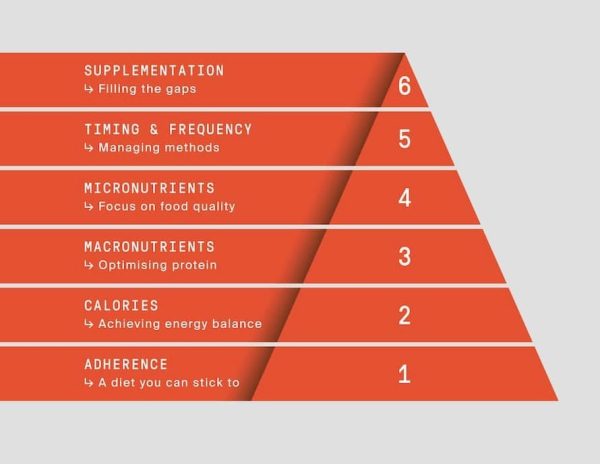(Disclaimer: Supplement use is a controversial topic and I do not intend to impose my views on the reader, just provide information)
The creation of Supplements has led to the emergence of a billion-dollar industry. New products have made healthcare easier, helped people with various conditions, and revolutionized health and fitness. Since their invention, obtaining proper nutrition is easier and more convenient in many ways. For instance, if one struggles to get enough micronutrients in their diet, they can purchase a multivitamin supplement from their local pharmacy.
So, how have supplements created problems? The issue with supplements revolves around the fitness industry. Therefore, to understand what the problems are, one must investigate their purpose and where they belong on the food map.
The Nutrition Pyramid
The muscle and strength nutrition pyramid above was designed by Eric Helms, a well-known fitness trainer with a PhD in sports and exercise. In the model, adherence to one’s diet and calorie balance are the most important, followed by macronutrients. After that, the model ranks micronutrients, an element of good diets that is often overlooked, and timing and frequency, an interesting physiological and psychological phenomenon to explore. Finally, supplements are shown at the top of the model, meaning that are the least important to one’s nutrition plan. Supplements should only be used to fill in the gaps that nutrition and exercise cannot provide.
The Problem With Supplements
So how does the nutrition pyramid relate to issues surrounding supplement consumption? Unfortunately, many individuals give supplements too much importance in their diets and choose to replace proper nutrition with a pill. According to Jamie Ducharme, a health correspondent for TIME, “roughly 90% of American adults do not eat enough fruits and vegetables, but many are trying to make up for it by popping pills.”
Instead of being the last resort in terms of creating a good nutrition plan, many people turn to supplements before identifying the flaws in their diets. This proves to be costly, as buying a supplement is much more expensive than purchasing proper food from the grocery store. While many people need supplements for various reasons, far too many take them unnecessarily instead of finding other ways to fulfill their unique nutritional requirements.
Supplement Regulation
Supplements are some of the least regulated healthcare products available. Technically, companies are expected to follow what the FDA calls “good manufacturing practices”, otherwise known as GMPs. However, according to the Operation Safety Supplement program, a military initiative that helps both civilians and military personnel, while GMPs should “help ensure that a dietary supplement product is manufactured, prepared, and stored properly and meet certain quality standards,” there is unfortunately “no approval process for dietary supplements.” After being on the market, supplements can contain faulty labels, inaccurate ingredients/dosages, or even dangerous substances such as PEDs. In fact, according to a 2019 study “more than half of supplements, including herbal botanicals, may be mislabeled.”
Mislabeling occurs so abundantly that shoppers may not realize they purchased the wrong supplement. Furthermore, misinformation on supplements is dangerous. The same source states that “a 2022 study found an estimated ~30% [of supplements contain] a toxic or banned ingredient.”
A Solution to the Problem
Unfortunately, it is not practical to go through every single ingredient of every supplement in a store, but there are a few tips that can help. First, supplements should be a last resort. If a nutrient can be obtained with a good diet, no supplement is needed. Most importantly though, when checking supplement packaging, see if it contains a badge reading “NSF certified for sport.” The NSF certification ensures that “what is on the label is in the package and that the product does not contain unsafe levels of contaminants, prohibited substances or masking agents.” Consumers may not be able to fix the supplement industry’s problems, however, they can remain safe with these tips.




